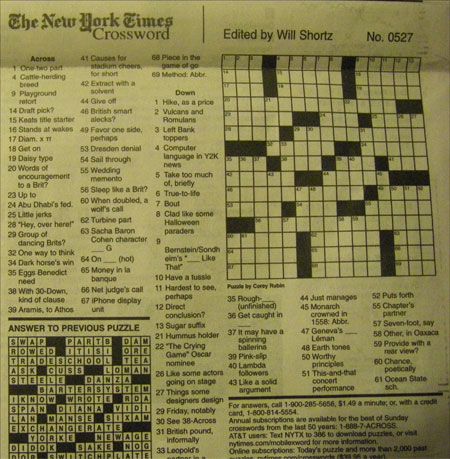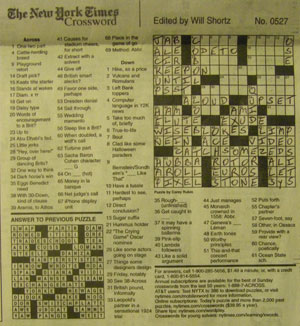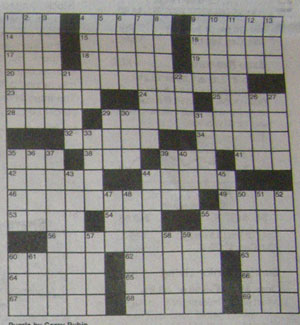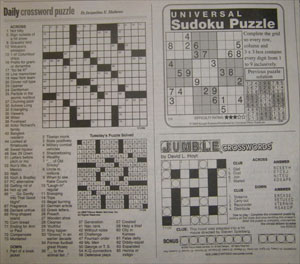I started to get into the NYT crossword from buying the Sunday paper. Bear and I would spend our lazy Sunday afternoons working the puzzle together. But then something magical happened. As I began buying the daily newspaper, it occurred to me that they also syndicate the puzzle during the week:

The New York Times Crossword
Once I started doing the weekly puzzle, I realized that it's actually more fun and more challenging than the Sunday puzzle. I know, solving the Sunday New York Times puzzle is regarded by many to be a feat of intelligence, but get this: the weekly puzzle gets progressively more difficult throughout the week. The Monday puzzle is a cakewalk, but the Saturday puzzle is next to impossible. As a reference point, the Sunday puzzle is often said to have the same level of difficulty as a Thursday puzzle.
I am writing this on a Wednesday and have found that the Wednesday puzzle is generally a nice bridge between difficulty levels. You can definitely solve it on your own, but it'll take more time than a Monday or Tuesday puzzle.

For example, this puzzle is themed (another commonality of the NYT puzzle). There are three long across answers that all contain something that Brits do and the clues have question marks, letting you know that they're a play on words.
Clue: British smart alecks?
Answer: Wise Blokes (get it, wise guys?)
This puzzle continues with keep in lorryin and catch some zeds in true British spirit.

Some other interesting bits of trivia about the New York Times Crossword:
- The puzzle is almost always symmetrical (turn it upside down and the pattern is the same)
- All the puzzles are edited by Will Shortz, but he doesn't write the puzzle, he edits them
- Will Shortz is the 4th puzzle editor since the puzzle debuted in 1942, so the job tenure is akin to being a Supreme Court justice
- If there's an abbreviation in a clue, the answer will be abbreviated
- The clues and answers will always agree in tense and number
- If the answer is a phrase, the clue will be in quotes
- The weekly puzzles contain common clues and answers throughout the week, so it's easier to solve a Saturday puzzle if you've done the earlier ones (from my experience)
- While the New York Times is famous for its puzzle, the crossword was actually invented by Arthur Wynne who created the first puzzle in 1913 for The New York World
- The New York Times puzzle is syndicated and carried by hundreds of papers, but the syndicated version is always 5 weeks old so if you want today's puzzle, you have to get the New York Times

Of course, if your local paper is like mine, they also feature a Daily Crossword, but I've found that the daily puzzles lack a theme and the art/science/literary references that make the NYT puzzle so famous. It's the Wheel of Fortune to the NYT's Jeapardy!
July 01, 2009
comments powered by Disqus

